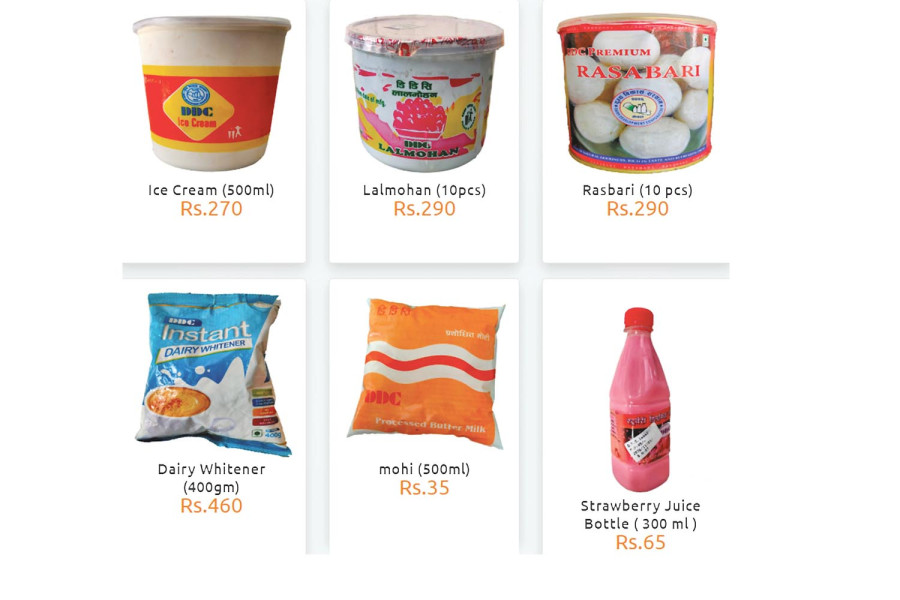Money
DDC’s unpaid dues rise to Rs700 million in flush season
At this time, the public utility purchases excess milk from farmers and converts it into powder for use during the lean season.
Post Report
The state-owned Dairy Development Corporation (DDC) has reported a rise in outstanding dues to farmers citing the flush season, during which milk production increases, necessitating higher purchases.
The corporation’s dues have accumulated to Rs700 million, despite an agreement with the private sector to supply whey. A month ago, the dues stood at Rs580 million.
“Due to the flush season, we have been purchasing more milk from farmers, which has increased our payment obligations,” said Surya Prasad Paudel, general manager of the DDC, who retired on Friday.
DDC buys milk worth Rs250 million per month.
“During the flush season, DDC purchases excess milk from farmers and converts it into powder for use during the lean season,” Paudel said.
“We cleared the payment of dairy farmers until mid-September last year, but the payments for the last four months are still pending. However, if the management team operates in a disciplined way, all payments can be cleared by mid-June,” he added.
Paudel said that the stock sales of butter and powdered milk are improving and remain manageable. DDC has 700 tonnes of butter and 600 tonnes of powdered milk in stock.
Nepal experiences two extreme milk production seasons—flush and lean. The flush season, which runs from August to February, produces excessive supply, while the remaining months constitute the lean season. The lean-to-flush season production ratio is approximately 1:3.
Last year, during the flush season, payments due to farmers had increased to Rs1.50 billion.
When Paudel joined the corporation in mid-July last year, farmers had not been paid for nine months. However, payments have been gradually disbursed, and the corporation continues to buy milk from farmers.
Powdered milk production has been ramped up, and sales have also increased.
As per an agreement, Manaram Group, a major exporter of dog chew to the US market, is purchasing whey made from 10,000 litres of milk from the DDC.
On December 18, the cash-strapped DDC signed a deal to supply raw cheese to Manaram Group to generate revenue as the company struggles financially. Since December 30, DDC has supplied 1,000 kg of raw cheese or whey daily to Himalayan Dog Chew.
Manaram Group exports 100 tonnes of dog chew monthly under the ‘Himalayan Dog Chew’ brand, produced in its plant in Godak, Ilam. The whey supplied to the company comes from DDC’s Biratnagar Milk Supply Scheme.
The rising prices of dairy products, with milk crossing Rs110 per litre, have led to a decline in demand. This, coupled with falling income levels, increased unemployment, and a rise in youth migration, has contributed to an accumulation of unsold dairy stock, leaving farmers unpaid for months.
Nepal is currently experiencing a dairy sector downturn.
To mitigate losses, DDC plans to export butter to China. The Agriculture Ministry has begun collaborating with the General Administration of Customs of China (GACC) to facilitate this process. However, paperwork delays at the Department of Food Technology and Quality Control have slowed progress, according to Paudel.
Meanwhile, the private dairy sector claims to have cleared its dues and continues to make regular payments.
“We have 300 private dairy firms under our association across seven provinces. As per our records, they have cleared all outstanding payments,” said Prahlad Dahal, president of the Nepal Dairy Association.
Dahal stated that private dairy operators make payments to farmers bi-weekly.
During the Nepal-India Inter-Governmental Committee (IGC) meeting on Trade, Transit, and Cooperation to Combat Unauthorised Trade, held in Kathmandu on January 10, Nepal agreed to explore the possibility of importing specific dairy items such as whey and cheese, which are not produced in sufficient quantities within the country.
Nepal has recently imposed a blanket ban on importing buttermilk, cheese, butter, pasteurised milk, and other dairy products from India’s Amul brand, citing sufficient domestic production.
India has raised concerns over Nepal’s ban on its milk exports.




 14.12°C Kathmandu
14.12°C Kathmandu












